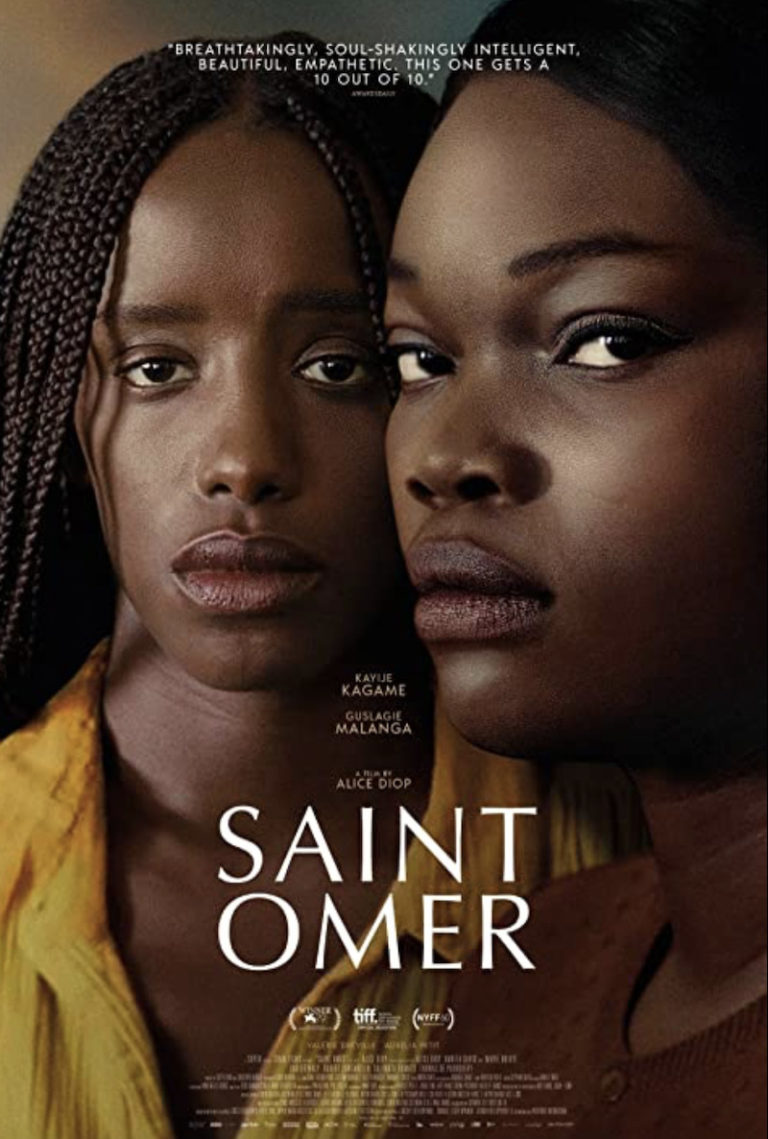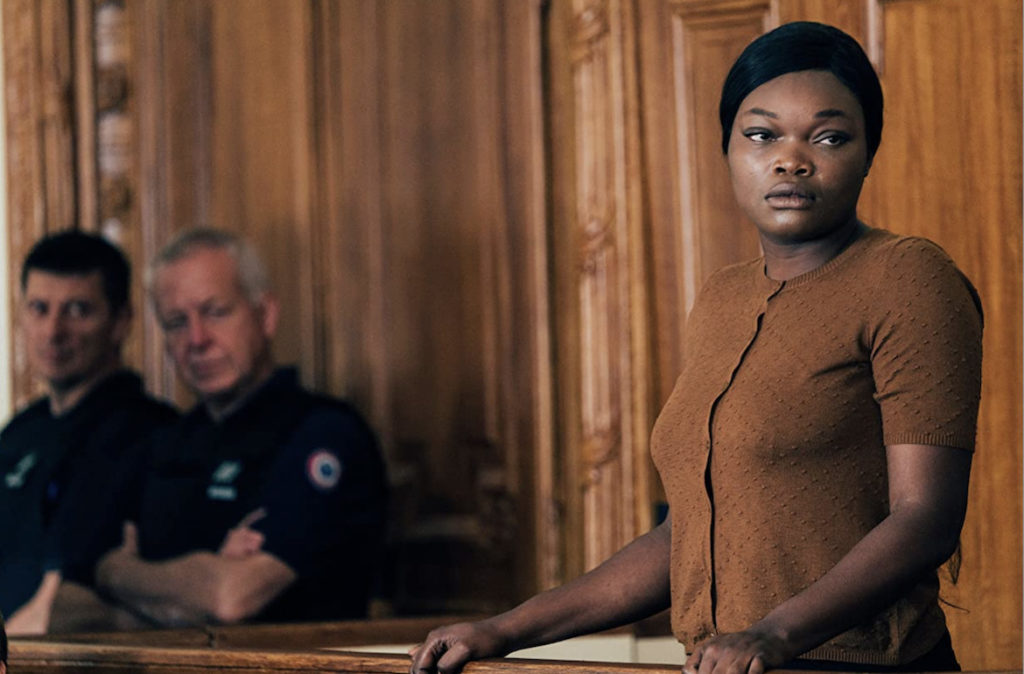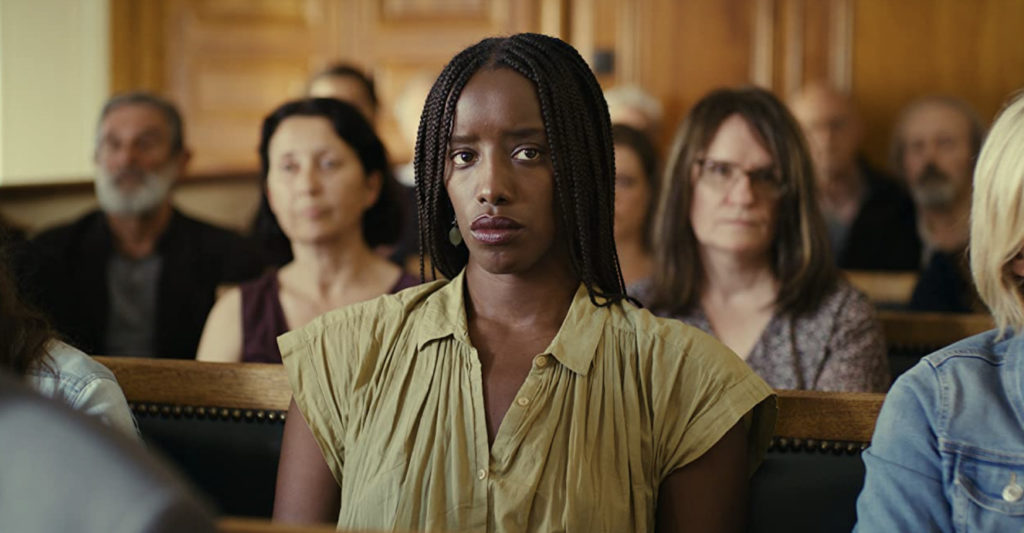
Synopsis : Saint-Omer court of law. Young novelist Rama attends the trial of Laurence Coly, a young woman accused of killing her 15-month-old daughter by abandoning her to the rising tide on a beach in northern France. But as the trial continues, the words of the accused and witness testimonies will shake Rama’s convictions and call into question our own judgement.
Rating: PG-13 (Brief Strong Language|Some Thematic Elements)
Genre: Drama
Original Language: French (France)
Director: Alice Diop
Producer: Toufik Ayadi, Christophe Barral
Writer: Alice Diop, Marie N’Diaye, Amrita David
Release Date (Theaters): Jan 13, 2023 Limited
Box Office (Gross USA): $87.0K
Runtime: 2h 2m
Distributor: Super LTD
Sound Mix: Dolby Digital

Exclusive Interview with Actress Guslagie Malanda
Q: This film was based on a true story, what was your reaction when you first heard about the incident?
GM: I was afraid — basically that was my first reaction. I was very young when the story happened. I didn’t remember it but my parents did, yes.. I was so young. Maybe I heard a bit about [some kind of] case, but I don’t remember it clearly. I discovered the story of that woman, and discovered it first by Alice’s [Diop, screenwriter-director] memory of the trial. I discovered the story of Fabienne Kabou [who was convicted of the same crime] in a kind of fictional way — because it was Alice’s memories. I discovered the story first, but not the case.
Q: What kind of research did you do to understand the mentality of Laurence Coly? What was your research process like?
GM: It’s quite funny because with Alice, we made a rehearsal schedule and said, “We need to rehearse for maybe 10 or 12 sessions.” In the end, we [did] only two sessions. It was obvious to both of us that we needed to protect the words and make the shoot like it was a real trial. If we did a lot of rehearsal, it would have made it weird when we’d be shooting — so when we performed the words, we did them like we were presenting the testimony of Laurence Coly. I prepared myself alone, because I didn’t want to have an acting coach. I didn’t need someone who would teach me how to play this woman. I already knew that because I’m a woman, too. I preferred to have working sessions with a tai chi master, and only focus on my breathing.
Q: Did Alice go to the actual court and see all the different expressions of women there? What conversation did you have with Alice about the trial before shooting the film?
GM: I didn’t ask anything about the trial. I didn’t want to know anything — about the actual trial.
Q: You wanted to create a completely original character from the script?
GM: Yes, for me this was like making a documentary — and the documentary in Saint-Omer was the testimony of [the fictional] Laurence Coly — which is based on the real story of Fabienne Kabou who committed the actual crime. This is the archive of Saint-Omer. For me, to focus on the text was to focus on the actual trial. I didn’t want to know how many people [were there], or what happened exactly. The true archive is about the testimony. I didn’t want to know about it all because I didn’t want it to be a mirror for me, no.

Q: In the beginning of the trial, Coly spoke in a monotone with a straight face, but as the trial goes on it gets very emotional. What were the challenges in projecting those extremes?
GM:I think it’s the same for people in a real trial. A trial could be one week, two, maybe three weeks in France. Every day you wake up and you have to go to your trial. The first sentence you say in front of this audience, from the first day on to the third day, and maybe 10 days after that, you’re not the same emotionally. You’re not the same because you’re human, so everything affects you. During the shooting, it was the same for me. On the first day, I had to say my name in a very administrative way, “I’m Laurence Coly.” “My father is… and “My mother is…” The more and more it went, day after day, week after week. The questions were more about your intimacy, your story, the relationship you have with your parents, and the relationship you have with yourself. You become more sensitive. Sometimes it’s weird because I really wanted to talk with a real person [who was] on trial because sometimes you’re here and sometimes you’re not. Sometimes you think it’s about you, and you’re concerned because it’s like your own trial. But other times, it’s not like it’s your trial. I really felt that during the shooting, I was sometimes very, very present, and other times, very absent. It’s very intense to talk about yourself. It was very important for me that Alice wanted to shoot [the film] chronologically. The first day of the trial was the first day of shooting and the last day was the last day of the shoot. In [doing] that way, to be an actress, I wasn’t the same [from] the first day to the last day. It becomes more and more intense because the last day is the final day I have to speak about the murder.
Q: What is your collaboration with director Alice Diop like? She comes from a documentary background. Though this is a feature film, she used a documentary style of shooting. What elements about her direction fascinated you?
GM: I was much more concerned for how she was doing it for herself than I was fascinated by her way of working. Everybody went there all the time — every figurative person, the actors, everyone. When I spoke, there were 40 people in the room. When I wasn’t speaking, I was listening to someone who was close to me. It was intense. The judge was always there. My lawyer was there. The persons who followed the trial are there. During three weeks there were 15 people in that courtroom. During three weeks, these 15 people followed my trial. This is Alice’s set. We never pretended — [it felt real].
Q: We see Professor Rama is four months pregnant. We also see Coly’s mother and Coly. We see different types of mother and motherhood. What do you think this film says about motherhood? Did it change your perspective at all?
GM: A little bit. The question is great, but my answer would be too personal. It changed because I was a mother who keeps my child. Of course it changed something inside me regarding motherhood, childhood and my own relationship to my mother.
Q: This film was the Silver Lion award winner at the Venice Film Festival, and is now France’s entry for Best International Film for the upcoming Academy Awards. What is your reaction? Have you seen people embracing this film?
GM: It’s very important for me. I’m very happy that a film about a black woman — actually two black women, because there’s me and also Kayije Kagame — can be so universal. And colorism doesn’t exist because it’s about motherhood. It’s about sharing that state [of] what is motherhood. That’s the essence of the movie — what is it to be a mother? What is it to be a child? People talk about “Saint-Omer” in relation to motherhood, and that’s great. That surprised me a lot. We can talk about the murder and the trial, and other things as well. But in the end, the only topic regarding the movie that people want to talk about is that it’s about motherhood. And that’s powerful.
Check out more of Nobuhiro’s articles.
Here’s the trailer of the film.

